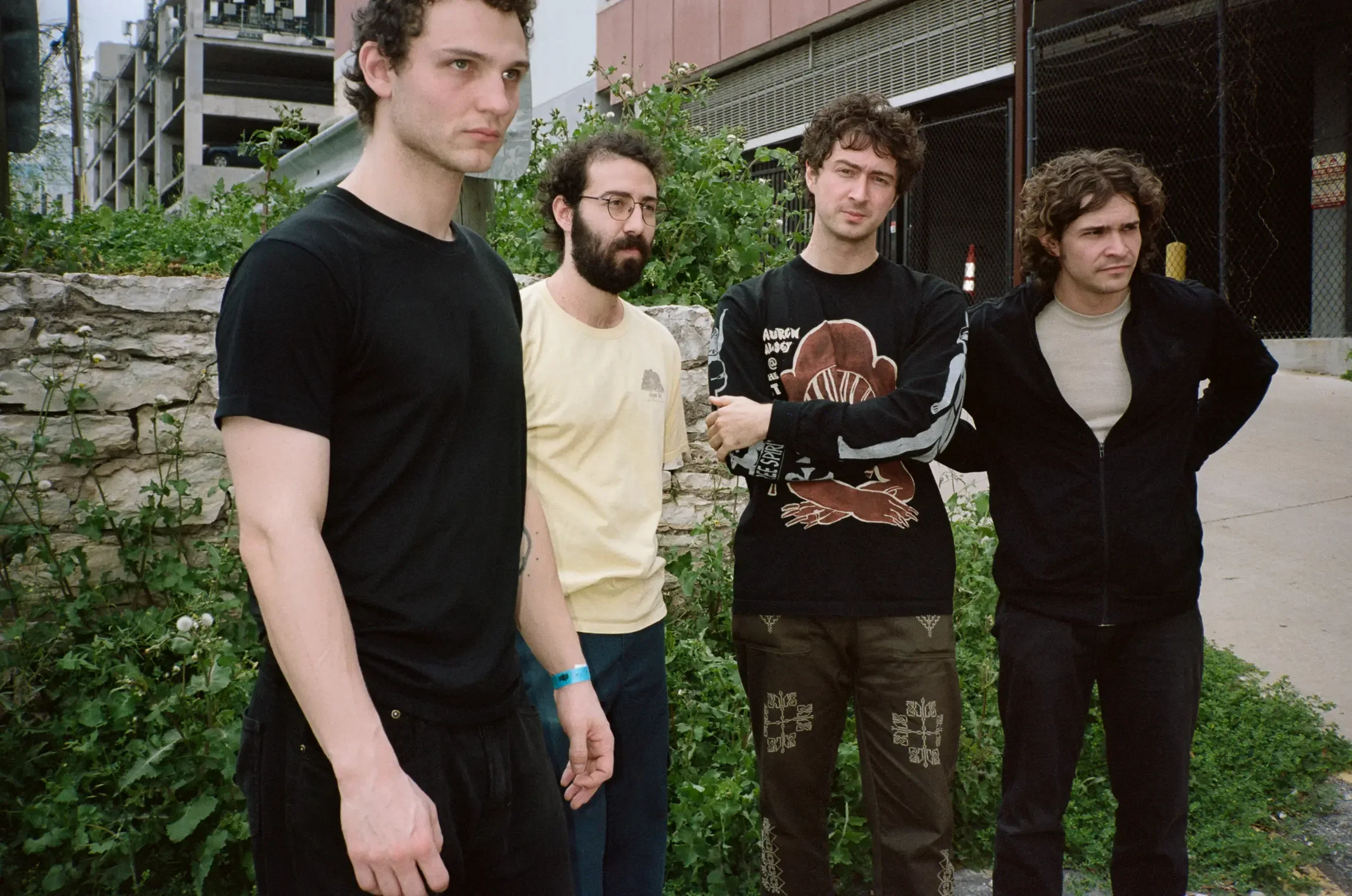No Wave in New York: How YHWH Nailgun’s ‘45 Pounds’ Maintains the Relevance of Anti-Establishment Scene Today
The No Wave quartet reflects on the grim realities of the changing metroplex and the importance of the anti-establishment scene with their 2025 release, 45 Pounds.
Written by Zachary Bolash
Photo courtesy of Ben Turok
In 1970s New York, malcontent artists guided by the mysteriously sultry duo Suicide spawned a distinct musical movement known as No Wave. The scene rejected the contemporary American canon of music. No-Wavers abandoned epic, bluesy guitar solos and drew upon another musical canon: classical music. No Wave’s signature spontaneous, atonal sound evokes classical music’s experimentations with improvisation and abrasiveness. In fact, The Ascension by Glenn Branca, one of No Wave’s key records, are oeuvres transposed to stringy guitar solos. In summary, No Wave is a genre that embraces classical musical spontaneity and absurdity, with a cynical, urbane worldview.
No Wave’s rejection of the musical canon and a cynical worldview responded to New York City’s increasing commercialization. To the founding No-Wavers, the influx of a wealthy suburbanite sensibility led them to seek out European classical music’s innovation, creating a resistance against the creeping corporatization threatening to erode the deep-seeded musical culture of New York. The tension in the city between incoming residents and native, metropolitan attitudes has been a perennial concern. As a result, the No Wave movement has haunted the city, recurring when the municipality is at a political crossroads.
Present day New York finds itself at one of those crossroads. The shifting socioeconomic conditions have ousted incumbent Mayor Eric Adams and have poised self-described socialist Zohran Mandani to take the city’s helm. This political situation has subsequently spawned infighting most notably among affluent expatriates and the middle-class natives struggling with rising costs. Enter YHWH Nailgun — a No Wave outfit consisting of vocalist Zack Borzone, percussionist Sam Pickard, sound engineer Jack Tobias, and guitarist Saguiv Rosenstock. In their 2025 album, 45 Pounds, the New York-based band wrestles with the city’s changing demographic through a sound that is irresistibly — and terrifyingly — No Wave.
The record’s second track, “Castrato Raw (Fullback),” aggressively confronts the realities of modern New York. “Castrato Raw (Fullback)” begins with Borzone’s larynx-straining yelp, where he exclaims, meditatively, that he has “got the fear in [him].” Pulsating percussion and a siren sounding backing track then interrupts his Kim Gordon-esque delivery. The signature No Wave atonal sounds create a track akin to a fever dream, a feeling unhelped by the orgasmic moans of Borzone, particularly in the lines, “Uh, my tear comes free / I got the fear in me.”
The track conveys a sense of horror, and in contextualizing it with the broader metropolis, “Castrato Raw (Fullback)” provides a No Wave-inspired glimmer into the troubled psyche of New Yorkers. The siren wails and polytechnic percussion mimics the city’s sonic landscape, police sirens, subway thumps, and construction white noise. “Castrato Raw (Fullback)” is sinister yet almost tender, accepting the city’s ugliness and welcoming listeners into its volatile landscape.
Where “Castrato Raw (Fullback)” invites, track seven of 45 Pounds, “Tear Pusher,” speaks to longtime residents. The song’s atonal melodies, accompanied by a synthesizer sound that sounds somewhere between a cat hurl and a vacuum, mimic the native New Yorker complaints about wealthy transplants. Borzone yelps that “vultures [are lifting] him by his hair.” In this song, “Vultures,” reference the wealthy’s avarice and desire for material gains at the expense of everyone. The grisly lyricism, accompanied by a haunting backing track with overlaid, warring percussion, represents the quiet class warfare of New York City. Longtime residents are finding themselves subject to the nonnative sensibility “vultures”: that uproot the histories and even the ugliness of the city, or, as Borzone says, the “demons” of natives.
YHWH Nailgun’s portrait of New York is undeniably nightmarish. It is rife with the usual vices and ugly municipal soundscapes, like siren wails and industrial ambience. Moreover, the changing demographics of the city seem partial to the wealthy. However, the last track of 45 Pounds, while sonically perplexing, is hopeful.
“Changer” tousles jungle-sounding drums with reedy and jazzy instrumentals, accelerating the track’s frantic pace. Yet, Borzone supplants his usual vocal delivery with a much more soothing tone, telling an unspecified person to “Lay a hand on [him], young believer / I read the signs, in waves of feeling.” The lines, within the broader context of the record, are perhaps intended to chart a new sense of optimism for the city despite its current trajectory.
“Changer” is a break from its horrorpunk predecessors and sheds a much more vulnerable, hopeful skin. It is a call to action for idealists to resist city “vultures” and preserve the vibrant, sometimes ugly culture of the metroplex by riding the No Wave. Or, as Borzone states, “to lay a hand on [him], young believer.”

